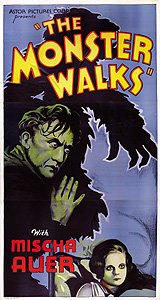 The Monster Walks/The Monster Walked (1932) *
The Monster Walks/The Monster Walked (1932) *
A few weeks ago, I got an e-mail from reader Robert A. Schadt arguing that I had been overly generous to director Frank Strayer in my assessment of The Vampire Bat, and that credit for that movie’s unexpected watchability more properly belongs to cinematographer Arthur Martinelli. “Just check out Strayer’s other stuff,” he said. “Condemned to Live, The Monster Walks, etc— they all suck.” Well, I hope you’re reading this, Robert, ‘cause I think you’re on to something there. The Monster Walks does indeed suck. Hard. A boring, rickety rehash of all the spooky-house commonplaces that more perceptive filmmakers were already starting to poke fun at in the mid-1920’s, it is a truly dreadful movie which is then made even worse by the demeaning antics of the hero’s black limo-driver. And more to my correspondent’s point, The Monster Walks features none of the eye-catching composition and production design which helped The Vampire Bat overcome its weaknesses.
Here’s something nobody will see coming: a rich man of questionable sanity has just died, and what few relatives he has are on their way to his creepy old house for the reading of the will. The deceased was a possibly mad scientist named Earlton (look, he’s got a killer ape locked up in the basement— the way I score it, that alone establishes a rebuttable presumption of mad scientist-hood on the doc’s part); the relatives are his crippled brother, Robert (Sheldon Lewis, from The Phantom and Seven Footprints to Satan), and his daughter, Ruth (Vera Reynolds). The latter is accompanied by her fiance, Dr. Ted Clayton (Rex Lease, of Dead Man’s Eyes and The Crimson Ghost), and his chauffeur, Exodus (Willie Best, from The Face of Marble and The Monster and the Ape, who was still calling himself “Sleep ‘n’ Eat” in those days— good job fighting those racist stereotypes there, Willie). Also present are Earlton’s lawyer, Herbert Wilkes (Sidney Bracey, of Freaks and The Monkey’s Paw, with a big enough part to get his name on the credits for once), and his servants, Emma Krug (The Cat and the Canary’s Martha Mattox) and her son Hans (Mischa Auer, from Murder at Dawn and the less famous of the two movies called Dr. Terror’s House of Horrors). The servants have some kind of sinister secret, the ape in the basement has always hated Ruth, and the terms of the will make it highly advantageous for Robert to murder his niece— she gets the whole estate while Robert gets a stipend… unless, of course, the girl dies, in which case old Bobby finds himself in possession of the house, the money, and everything. Honestly, I could stop right now, and you’d be able to work out the whole rest of the movie by yourself. In fact, I think will stop right now.
There are absolutely no surprises in The Monster Walks, nor is there much of anything else, either visual or narrative, to hold the attention of any but the most undemanding audience. The story is a virtual litany of clichés: Creepy house? Check. Dead rich guy? Check. Reading of the will? Check. Secret passages? Check. Murderous simian who isn’t really the killer? Check. Useless, blubbering heroine? Check. Scene with simian hand reaching out of secret passage in an attempt to strangle blubbering heroine in her bed? Check. About the one thing I can honestly say in this movie’s favor is that it is one of the very few mostly serious films of its type that is still readily available today. Though Willie Best is on hand to supply some of the most loathsome comic relief on record, Exodus is very much a minor character, with few scenes and no impact whatsoever on the plot. Consequently, The Monster Walks seems to take itself far more seriously than the majority of its better-known cousins, and because the spooky-house mystery is a genre that most modern viewers will have experienced only in parody, it is instructive to see a straight take on the formula that was toyed with by later movies like The Gorilla and One Body Too Many. Its didactic value for self-made film historians does nothing to make The Monster Walks any more bearable for anybody else, however, and most people would be well advised to give this one a pass.
Home Alphabetical Index Chronological Index Contact
